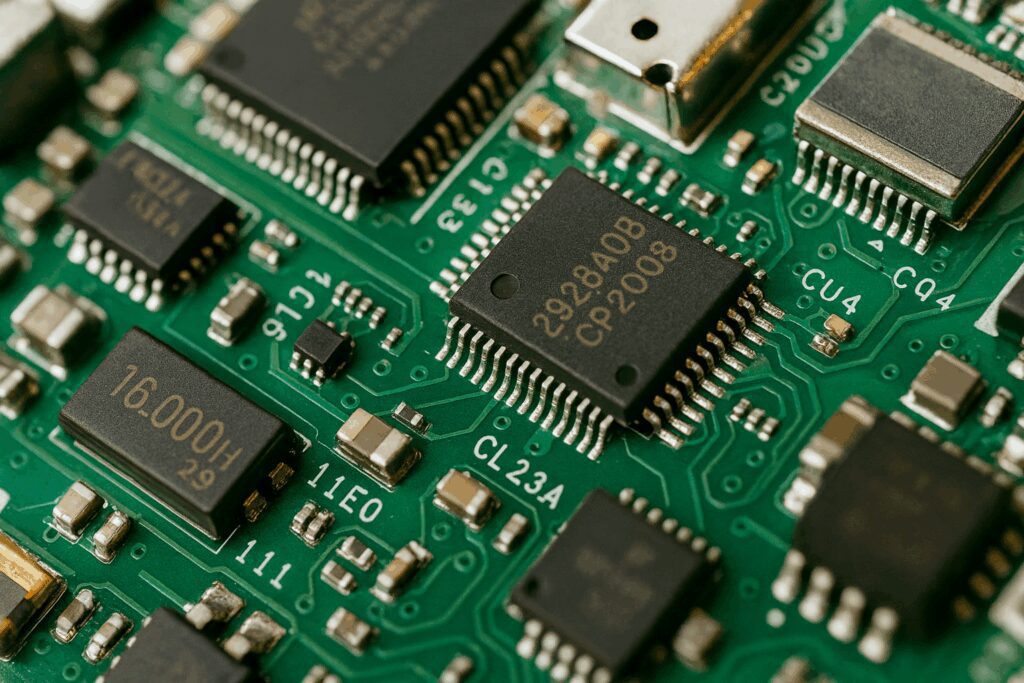The global semiconductor industry is undergoing a significant transformation, driven by increasing demand for advanced chips across various sectors, including automotive, consumer electronics, and industrial applications. In this context, the recent opening of GlobalWafers’ new $3.5 billion 300 mm wafer fabrication facility in Sherman, Texas, marks a pivotal moment in the United States’ efforts to strengthen its domestic semiconductor supply chain. Supported by funding from the CHIPS Act, this facility represents a major investment in U.S. manufacturing capabilities and has far-reaching implications for contract manufacturers serving the semiconductor industry.
This article explores the significance of the GlobalWafers facility, its role in the broader semiconductor ecosystem, and how it impacts contract manufacturers operating within the U.S. market. We will also examine the strategic importance of the CHIPS Act, the benefits of localized production, and the potential challenges that lie ahead.
Background on GlobalWafers and the Sherman Facility
GlobalWafers Co., Ltd., headquartered in Taiwan, is one of the world’s leading manufacturers of silicon wafers, which are the foundational materials used in semiconductor production. Silicon wafers serve as the base layer onto which integrated circuits are built, making them a critical component in chip manufacturing. The company has been expanding its global footprint in response to growing demand for high-quality wafers, particularly in the wake of global supply chain disruptions and geopolitical tensions.
In March 2025, Reuters reported that Tesla was planning to build a new megafactory in Texas (Reuters). While this report focuses on Tesla, it reflects the broader trend of increased industrial activity in the state, especially in the technology and energy sectors. Coinciding with this growth is the establishment of GlobalWafers’ new 300 mm wafer fab in Sherman, Texas—a project that has received significant federal support under the CHIPS and Science Act of 2022.
The Sherman facility, which cost approximately $3.5 billion to construct, is designed to produce 300 mm silicon wafers—the largest and most advanced wafer size currently used in semiconductor manufacturing. These wafers enable higher yields and greater efficiency in chip production, making them essential for fabricating next-generation semiconductors used in everything from smartphones to electric vehicles (EVs) and artificial intelligence (AI) systems.
The Role of the CHIPS Act in Enabling Domestic Semiconductor Growth

The passage of the CHIPS and Science Act in August 2022 marked a turning point in U.S. semiconductor policy. This legislation allocated over $52 billion in direct financial assistance and incentives to support the domestic production of semiconductors and related technologies. The primary objectives of the CHIPS Act are to reduce U.S. reliance on foreign suppliers, bolster national security, and enhance economic competitiveness in an increasingly digital world.
GlobalWafers’ Sherman facility is among the first major projects to benefit from this initiative. The U.S. Department of Commerce, through the National Institute of Standards and Technology (NIST), awarded the company a grant of up to $400 million to support the construction and operation of the plant. This funding not only reduces the financial burden on the company but also signals strong government backing for expanding the U.S. semiconductor materials sector.
By incentivizing companies like GlobalWafers to establish operations in the U.S., the CHIPS Act aims to create a more resilient and self-sufficient supply chain. This is particularly important given the ongoing geopolitical tensions between the U.S. and China, which have led to export controls and trade restrictions affecting semiconductor materials and equipment.
Implications for U.S. Contract Manufacturers
Contract manufacturers—also known as foundries or semiconductor fabrication service providers—play a crucial role in the semiconductor value chain. These companies manufacture chips on behalf of fabless design firms, original equipment manufacturers (OEMs), and other clients who do not own their own fabrication facilities. With the rise of specialized manufacturing processes and the increasing complexity of chip designs, contract manufacturers have become indispensable partners in bringing semiconductor products to market.
The opening of the GlobalWafers facility in Texas offers several key advantages for U.S.-based contract manufacturers:
- Stable Supply of High-Quality Wafers: One of the most immediate benefits is access to a reliable source of 300 mm silicon wafers. Prior to the establishment of the Sherman plant, U.S. contract manufacturers were heavily reliant on imports from Asia, particularly from Taiwan, South Korea, and Japan. This dependence introduced risks related to logistics, tariffs, and geopolitical instability. With a local supplier now in place, manufacturers can better manage inventory levels and reduce lead times.
- Enhanced Cost Efficiency and Operational Flexibility: Proximity to raw materials allows contract manufacturers to streamline their operations and reduce transportation costs. Additionally, having a domestic wafer supplier enables closer collaboration on product specifications, quality control, and just-in-time delivery models. This flexibility is especially valuable for companies producing custom or application-specific integrated circuits (ASICs).
- Alignment with Government Incentives and Export Controls: As part of the CHIPS Act framework, U.S. contract manufacturers that utilize domestically sourced materials may be eligible for additional subsidies or preferential treatment in government contracts. Furthermore, with the U.S. imposing stricter export controls on semiconductor technologies to certain countries, having access to trusted, locally produced inputs becomes a strategic advantage.
- Support for Advanced Packaging and Chiplet Integration: The availability of high-purity, large-diameter wafers facilitates the development of advanced packaging techniques such as fan-out wafer-level packaging (FOWLP) and chiplet integration. These technologies allow multiple dies to be combined into a single package, improving performance and reducing power consumption. U.S. contract manufacturers that adopt these approaches will be better positioned to compete globally.
- Workforce Development and Local Economic Impact: The GlobalWafers facility is expected to create hundreds of high-skilled jobs in engineering, materials science, and manufacturing. This influx of talent contributes to the overall growth of the semiconductor ecosystem in Texas and provides opportunities for contract manufacturers to recruit qualified personnel. Moreover, the presence of upstream suppliers like GlobalWafers encourages further downstream investments, creating a virtuous cycle of innovation and job creation.
Strategic Importance of Texas as a Semiconductor Hub
Texas has long been a hub for semiconductor research and manufacturing, home to major players such as Texas Instruments, Samsung, and NXP Semiconductors. The addition of GlobalWafers’ Sherman facility strengthens the state’s position as a leader in the U.S. semiconductor industry.
Several factors contribute to Texas’s appeal as a semiconductor manufacturing location:
- Pro-Business Environment: Texas offers favorable tax policies, minimal regulatory barriers, and a robust infrastructure for industrial development.
- Skilled Workforce: The state’s universities and technical institutions provide a steady pipeline of engineering graduates and skilled labor.
- Access to Markets: Texas’s central location and well-developed transportation networks make it an ideal base for serving both domestic and international markets.
- Energy Availability: Semiconductor manufacturing requires substantial energy inputs, and Texas’s abundant natural gas and renewable energy resources help ensure stable and affordable power supplies.
These advantages make Texas an attractive destination for both upstream suppliers like GlobalWafers and downstream contract manufacturers seeking to expand their operations.
Challenges and Considerations for Contract Manufacturers

While the GlobalWafers facility presents numerous opportunities, U.S. contract manufacturers must also navigate several challenges:
- High Capital Expenditure Requirements: Building and maintaining advanced fabrication facilities require significant capital investment. Although the CHIPS Act provides financial support, many companies still face high upfront costs and long payback periods.
- Talent Shortages: Despite Texas’s strong educational institutions, there remains a shortage of highly skilled workers in specialized areas such as semiconductor process engineering, materials science, and automation. Companies must invest in training programs and partnerships with academic institutions to address this gap.
- Environmental Regulations and Sustainability Pressures: Semiconductor manufacturing is resource-intensive and generates waste products that require careful handling. As environmental regulations tighten and stakeholders demand greater sustainability, contract manufacturers must adopt greener practices and invest in water recycling, emissions reduction, and energy efficiency initiatives.
- Geopolitical Uncertainties: While the CHIPS Act aims to insulate the U.S. from global supply chain shocks, the semiconductor industry remains vulnerable to geopolitical developments. Changes in trade policy, export controls, or diplomatic relations could affect sourcing strategies and customer relationships.
- Technological Obsolescence Risks: The rapid pace of innovation in semiconductor technology means that today’s cutting-edge processes may become obsolete within a few years. Contract manufacturers must continuously upgrade their capabilities to remain competitive, which requires ongoing R&D investment and strategic foresight.
Conclusion
The opening of GlobalWafers’ $3.5 billion 300 mm wafer facility in Sherman, Texas, supported by CHIPS Act funding, represents a landmark achievement in the revitalization of the U.S. semiconductor industry. For contract manufacturers, this development offers a host of benefits, including a stable supply of high-quality wafers, reduced logistics costs, and alignment with national security and economic priorities.
However, success in this evolving landscape will depend on a combination of strategic investments, workforce development, environmental stewardship, and adaptability to technological change. By leveraging the opportunities provided by the GlobalWafers facility and the broader CHIPS Act framework, U.S. contract manufacturers can strengthen their competitive position and contribute to a more resilient and innovative semiconductor ecosystem.
As the industry continues to evolve, the collaboration between government, academia, and private enterprise will be essential in sustaining momentum and ensuring long-term success.
Works Cited
“Tesla to Build New Megafactory in Texas, Electrek Reports.” Reuters, 5 Mar. 2025,www.reuters.com/business/autos-transportation/tesla-build-new-megafactory-texas-electrek-reports-2025-03-05/?utm_source=chatgpt.com.
U.S. Department of Commerce. “CHIPS and Science Act Overview.” National Institute of Standards and Technology,www.nist.gov/programs-projects/chips-and-science-act-overview.
GlobalWafers Co., Ltd. “About Us.” www.globalwafers.com/en/about-us .
Texas Instruments Incorporated. “Semiconductor Manufacturing in Texas.”www.ti.com/company.html .
U.S. Department of Commerce. “CHIPS Program Awards: GlobalWafers Sherman, TX Project.”www.commerce.gov/news/factsheets/2024/07/chips-program-awards-globalwafers-sherman-tx-project .
Saxena, Shalini. “The Future of U.S. Semiconductor Manufacturing.” Forbes, 10 Feb. 2024, www.forbes.com/sites/forbestechcouncil/2024/02/10/the-future-of-u-s-semiconductor-manufacturing.
Gartner, Inc. “Market Analysis Report: Global Semiconductor Wafer Market Forecast.” Gartner Research, 2024.
U.S. Senate Committee on Commerce, Science, and Transportation. “The CHIPS and Science Act: Strengthening America’s Semiconductor Industry.” 2023, www.commerce.senate.gov/services/files/CHIPS_Act_Report.pdf.
IEEE Spectrum. “Advanced Packaging Techniques in Modern Semiconductor Manufacturing.” IEEE, 2023, spectrum.ieee.org/semiconductor-manufacturing.
U.S. Energy Information Administration. “Electricity Prices in Texas.” www.eia.gov/electricity/monthly/epm_table_grapher.php?t=epmt_5_6_a .
At Vergent Products, we’re more than just a contract manufacturer — we’re your full-service partner in turning innovative ideas into high-quality, market-ready products. With over 30 years of experience and a commitment to excellence, we offer end-to-end solutions tailored to your unique needs.
Whether you’re looking for precision PCB Assembly and Contract Manufacturing, robust Design and Development Support, or seamless Program & Test Engineering, our team ensures every step of the process is efficient, reliable, and scalable.
We understand that no two products are the same. That’s why we provide customized Configure-to-Order (CTO) services and integrated Third-Party Logistics (3PL) to streamline your supply chain and get your product where it needs to be — fast.
Navigating today’s complex supply chain landscape can be challenging, but with our proactive Supply Chain Risk Management strategies, you can mitigate risks and maintain production continuity.
From concept to delivery, Vergent Products is here to support your success with structured project management, advanced quality systems, and U.S.-based manufacturing you can trust.
Contact Us Today to schedule a consultation and see how we can help bring your product to market — on time, on spec, and on budget.

